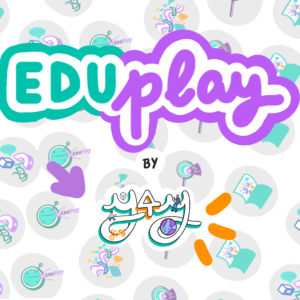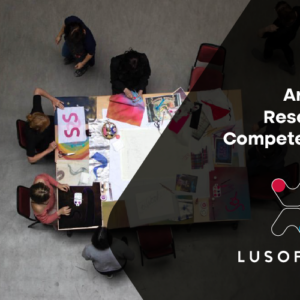Beyond the Board: Using Analogue Games to Develop Abstract Thinking and Soft Skills

About This Course
This online course explores the potential of analogue games to foster the development of abstract concepts and soft skills. Through hands-on game design and play, learners will explore how analogue games can support the development of skills such as creativity, critical thinking, problem-solving, communication, collaboration, and empathy. In a broader manner, this course aims to be a pedagogical approach to disseminate some of the premises and conclusions of TEGA (2020-1-UK01-KA203-079248) project, namely regarding the potential of analogue games in higher education, and can be adapted to other contexts. The project was funded under the Erasmus + programme of the European Commission.
Please be aware that all subtitles in the videos are in English.
Course Type
Beyond the Board is a self-paced course that comes with a certification upon completion. All course content is currently available for learners to complete at their own pace. In this each theory is accompanied by practical examples from the field of board games. Furthermore, in addition to the online course, learners are encouraged to participate in TEGA’s Community of Practice (CoP) to continue their collaborative learning journey even after obtaining their certification. The CoP is designed to provide a space for learners to engage with one another and share insights, experiences, and best practices related to analogue game design and play.
Content
Module 1 – Introduction
- 1.1. Course Presentation
- 1.2. TEGA Project (2020-1-UK01-KA203-079248)
- 1.3. Project Aims
- 1.4. Inclusion and Diversity as Pillars of TEGA
- 1.4.1. TEGA accessibility and inclusion conceptual framework
- 1.5. Assessment (4 Questions)
Module 2 – Games and Learning
- 2.1. Games and Learning
- 2.2. Analogue Games and Learning
- 2.2.1. TEGA article “Playing at the School Table” (Sousa et al., 2023)
- 2.3. Games as Arenas for Experimentation
- 2.4. Assessment (3 Questions)
Module 3 – Collaboration in Analogue Gaming
- 3.1. What is Collaboration?
- 3.2. Collaboration in Analogue Games
- 3.3. Case Study – The Mind: Description and How to Play
- 3.4. Case Study – The Mind: Pedagogical Potential
- 3.5. Case Study – Team 3: Description and How to Play
- 3.6. Case Study – Team 3: Pedagogical Potential
- 3.7. Collaboration Mechanisms in Board Games
- 3.8. Assessment (4 Questions)
Module 4 – Communication in Analogue Gaming
- 4.1. What is Communication?
- 4.2. Communication in Analogue Games
- 4.3. Case Study – Dixit: Description and How to Play
- 4.4. Case Study – Dixit: Pedagogical Potential
- 4.5. Case Study – Codenames: Description and How to Play
- 4.6. Case Study – Codenames: Pedagogical Potential
- 4.7. Communication Mechanisms in Board Games
- 4.8. Assessment (4 Questions)
Module 5 – Creativity in Analogue Gaming
- 5.1. What is Creativity?
- 5.2. Creativity in Analogue Games
- 5.3. Case Study – Telestrations: Description and How to Play
- 5.4. Case Study – Telestrations: Pedagogical Potential
- 5.5. Case Study – Junk Art: Description and How to Play
- 5.6. Case Study – Junk Art: Pedagogical Potential
- 5.7. Creativity Mechanisms in Board Games
- 5.8. Assessment (3 Questions)
Module 6 – Finalization and TEGA Community of Practice (CoP)
- 6.1. Collaboration | Communication | Creativity
- 6.2. MDA for Learning Purposes
- 6.3. Collaboration and Sharing
- 6.4. TEGA Community of Practice (CoP) – Presentation
- 6.5. TEGA Community of Practice (CoP) – Registration
- 6.6. TEGA Toolkit App – Presentation
- 6.7. Final Assessment (10 Questions)
Module 7 – Certificate
- 7.1. How to get the certificate?
Evaluation
For each assessment, you will have two tries to answer the questions. After two tries, if your answer is still wrong, the right option will be shown to you. Each question is marked with 1 point, in order to pass the course it is necessary to have 90% of correct answer, which is around 26 correct answers.
Learning Outcomes
The learning outcomes of this online course include:
- Exploring the specific characteristics of analogue games and how they facilitate the teaching-learning process.
- Understanding the potential of analogue games to foster the development of abstract concepts and soft skills, such as creativity, critical thinking, problem-solving, communication, collaboration, and empathy.
- Understanding basic game design concepts and how they can be used to enhance learning and engagement.
- Learning how to integrate analogue games into educational settings to enhance teaching and learning outcomes.
Direção do Curso

Carla Sousa
Carla Sousa é doutorada em Ciências da Comunicação pela Universidade Lusófona, onde também realizou a sua Licenciatura em Psicologia, Mestrado em Psicologia Clínica e da Saúde, e uma Pós-graduação em Neuropsicologia Aplicada. A sua tese de doutoramento abordou a acessibilidade de jogos como um caminho para capacitar e promover o bem-estar em indivíduos com deficiência intelectual, o que ilustra os seus principais objetivos de investigação – as diferentes intersecções entre os media, com um foco particular em jogos, inclusão, comportamento e diversidade humana. Também na Universidade Lusófona, Carla faz parte do Centro de Investigação em Comunicação Aplicada, Cultura e Novas Tecnologias (CICANT) e é professora assistente nos Cursos de Licenciatura em Psicologia e Videojogos. Publicou vários artigos como autora e coautora em revistas científicas, e apresentou comunicações em conferências nacionais e internacionais nos domínios dos estudos de media, psicologia dos media, jogos, acessibilidade, deficiência, inclusão social, aprendizagem e educação. Carla tem participado em vários projetos nacionais e internacionais financiados, é a gestora de atribuição de bolsas da Ação COST (CA 19104) – avanço da inclusão social através da Tecnologia e Empoderamento (a-Step), e é embaixadora da organização sem fins lucrativos Women in Games.
Ciência Vitae

Micael Sousa
Licenciado em Engenharia Civil e História, Mestre em Energia e Ambiente, e Estudos de Património. Candidato a Doutoramento em Ordenamento do Território (Universidade de Coimbra). Investigador no CITTA, com foco em jogos de planeamento analógico sério. Membro da ISAGA e SPCV. Professor, palestrante e instrutor de design de jogos em várias instituições, incluindo Universidade Lusófona, Instituto Politécnico de Leiria (Escola de Saúde) e IADE – Creative University.
Ciência Vitae

Cátia Casimiro
Cátia Casimiro possui uma Licenciatura em Comunicação Aplicada, bem como um Mestrado em Comunicação Organizacional. A sua Dissertação de Mestrado centrou-se na equidade da comunicação organizacional entre pessoas ouvintes e pessoas com perda auditiva. Atualmente, é candidata a doutoramento em Ciências da Comunicação. Os interesses de investigação de Cátia incluem comunicação, media e inclusão social e organizacional de Pessoas com Deficiência. Também está interessada em publicar e participar em projetos nessas áreas.
Ciência Vitae




